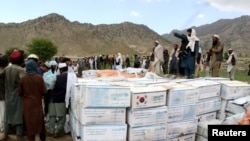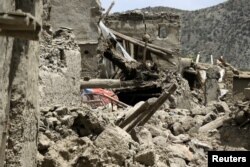Geneva —
U.N. aid agencies are rushing tons of relief items to aid thousands of people hit by a powerful earthquake Wednesday in the remote Afghan provinces of Khost and Paktika. More than 1,000 people reportedly have been killed and at least 1,600 others are injured.
Aid agencies expect the number of reported deaths and injuries to rise as the search and rescue operation continues in southeastern Afghanistan. They note many people were sleeping in their mud houses when the 5.9-magnitude quake struck.
Speaking from the capital, Kabul, UNICEF Representative to Afghanistan Mohamed Ayoya said at least 121 children were killed and 67 injured in the devastation that has destroyed or damaged thousands of homes.
He said a team of health professionals was on the ground in the worst affected districts soon after the earthquake struck in the early hours of June 22. He said they are assessing the extensive damage and urgent needs.
“Already we know that children and families affected by the earthquake are in urgent need of shelter, clean water, medical care, and protection,” Ayoya said. “Children and adolescents are extremely vulnerable and at high risk of family separation, emotional and psychological distress, abuse and exploitation, and other forms of violence.”
Ayoya said UNICEF is providing emergency medicine and medical supplies, as well as kits to treat children with watery diarrhea and to help prevent the spread of cholera. He said people are at high risk for these illnesses due to damaged water systems and limited hygiene.
The U.N. refugee agency has also delivered tons of relief supplies from its stockpiles in Kabul to affected areas. UNHCR spokeswoman Shabia Mantoo said the items, which include tents, blankets, jerry cans, kitchen supplies and other essential items, are enough to support some 4,200 survivors.
“UNHCR deployed staff who will help arrange shelters for people who have been left homeless by the devastation,” Mantoo said. “UNHCR teams are establishing three supply hubs in Giyan, Bermal, and Spera districts so that humanitarian support arriving from Kabul can be swiftly shifted to the communities affected by the earthquake.”
Mantoo said four decades of conflict and instability in Afghanistan have left millions of people on the brink of hunger and starvation. She said more support is urgently needed to avert a subsequent humanitarian disaster.
The hardline Taliban rulers who seized control of the country in August, also are appealing for international support.
Aid agencies expect the number of reported deaths and injuries to rise as the search and rescue operation continues in southeastern Afghanistan. They note many people were sleeping in their mud houses when the 5.9-magnitude quake struck.
Speaking from the capital, Kabul, UNICEF Representative to Afghanistan Mohamed Ayoya said at least 121 children were killed and 67 injured in the devastation that has destroyed or damaged thousands of homes.
He said a team of health professionals was on the ground in the worst affected districts soon after the earthquake struck in the early hours of June 22. He said they are assessing the extensive damage and urgent needs.
“Already we know that children and families affected by the earthquake are in urgent need of shelter, clean water, medical care, and protection,” Ayoya said. “Children and adolescents are extremely vulnerable and at high risk of family separation, emotional and psychological distress, abuse and exploitation, and other forms of violence.”
Ayoya said UNICEF is providing emergency medicine and medical supplies, as well as kits to treat children with watery diarrhea and to help prevent the spread of cholera. He said people are at high risk for these illnesses due to damaged water systems and limited hygiene.
The U.N. refugee agency has also delivered tons of relief supplies from its stockpiles in Kabul to affected areas. UNHCR spokeswoman Shabia Mantoo said the items, which include tents, blankets, jerry cans, kitchen supplies and other essential items, are enough to support some 4,200 survivors.
“UNHCR deployed staff who will help arrange shelters for people who have been left homeless by the devastation,” Mantoo said. “UNHCR teams are establishing three supply hubs in Giyan, Bermal, and Spera districts so that humanitarian support arriving from Kabul can be swiftly shifted to the communities affected by the earthquake.”
Mantoo said four decades of conflict and instability in Afghanistan have left millions of people on the brink of hunger and starvation. She said more support is urgently needed to avert a subsequent humanitarian disaster.
The hardline Taliban rulers who seized control of the country in August, also are appealing for international support.





